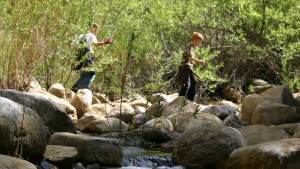By Dr. Franklin Dumond
I have to give my good friend Dave Kelle credit for a really keen leadership insight. He made a point during a pastor’s network meeting that in ministry we must be flexible enough to bend without snapping back.
When he made that observation I instantly traveled back to childhood hikes through the woods when a crafty, sneaky hiker could surprise the person behind them by suddenly releasing the branch they had just pushed out of the way.
This often resulted in a cry of alarm, a red whelp where the branch landed and a wary watchfulness from that point on with the result that the prank could only be used once during any given hike. I also seem to remember that these kinds of pranks didn’t occur when a parent was leading the procession!
When it comes to ministry in the 21st century flexibility and adaptability are essentials. The pace of life changes so rapidly that to remain technologically and socially current we have to use new language, establish new policies, and master new communication skills to be able to effectively present the timeless gospel in a timely fashion.
There are two dimensions to this flexibility that need to be considered. First we must be flexible but disciplined, lest the recoil slaps someone in the face unnecessarily. For example it may feel really good for a pastor to lash out at his people with an angry tirade from the pulpit or to storm out of a meeting in righteous indignation. While it may feel good, the backlash from that sudden release is never pleasant. No wonder the apostle Paul requires that believers bear one another’s burdens with the knowledge that what happens to one of us may well happen to another of us (see Galatians 6:2).
Second, flexibility must be built into our operations systems because without it those personal and/or institutional systems may break. Everyone who has been stopped in traffic on a major bridge while oncoming traffic is moving right along usually discovers with anxiety that this large, imposing, effective structure wiggles and sways a lot! Part of the reason these bridges maintain their effectiveness is a simple result of the flexibility designed into their steel and concrete skeletons. One key to this needed flexibility again comes from the apostle Paul when he models becoming all things to all people with the goal of winning some (see I Corinthians 9:22).
Here are three ways to improve your personal flexibility:
- Margin—if I have a little extra time or resources I am more likely to gain flexibility.
- Clearly defined expectations—when my tasks are defined I am more likely to gain flexibility since I will know what I am supposed to be doing, when it is to be completed. Thus like Nehemiah I can keep building the wall while avoiding unnecessary distractions.
- Empathy—seeing people the way Jesus sees people means that I can and will give greater attention to them and their needs rather than to me and my wishes (even when I secretly long for just one hiker’s prank of letting the branch go.)

